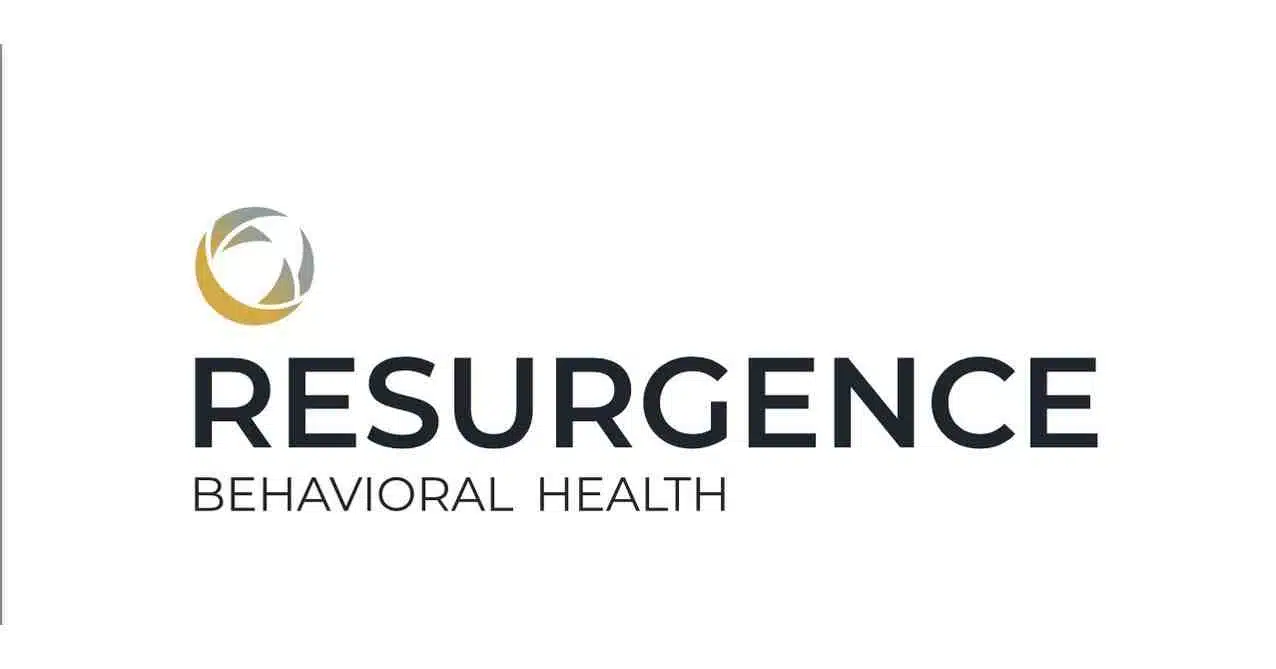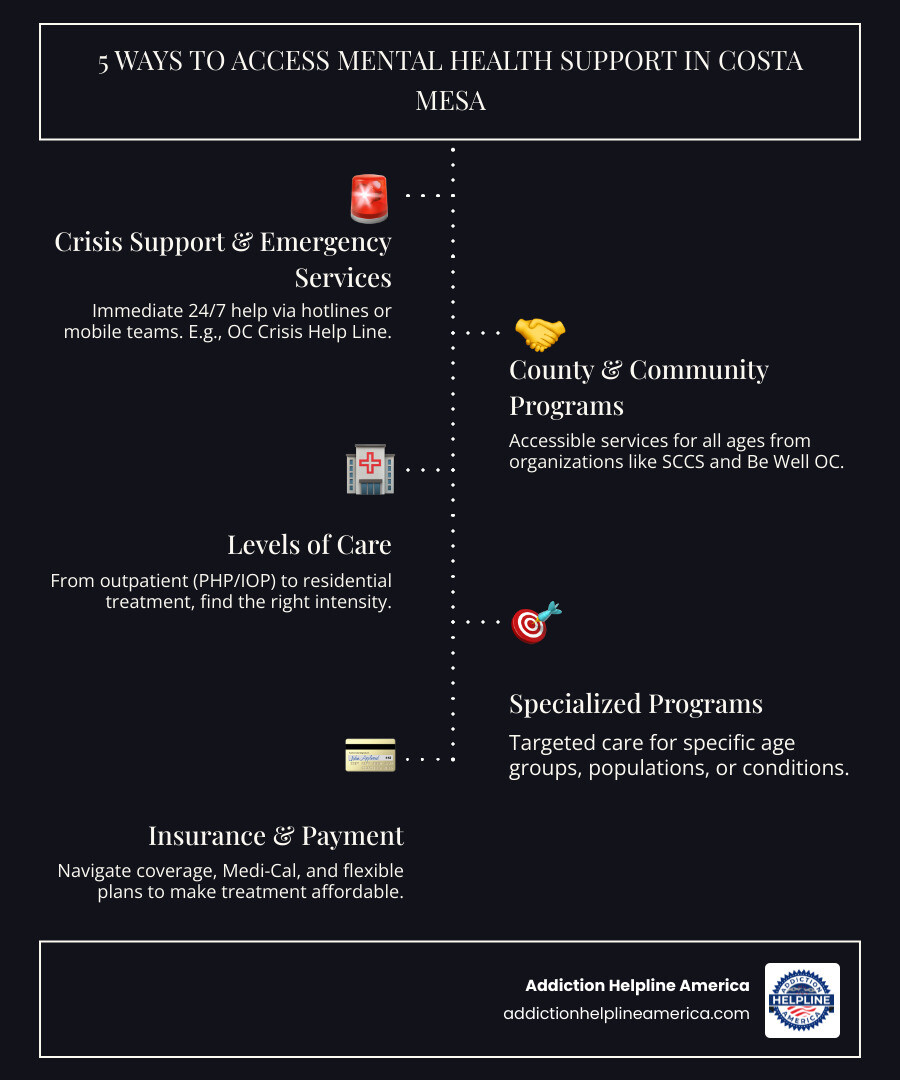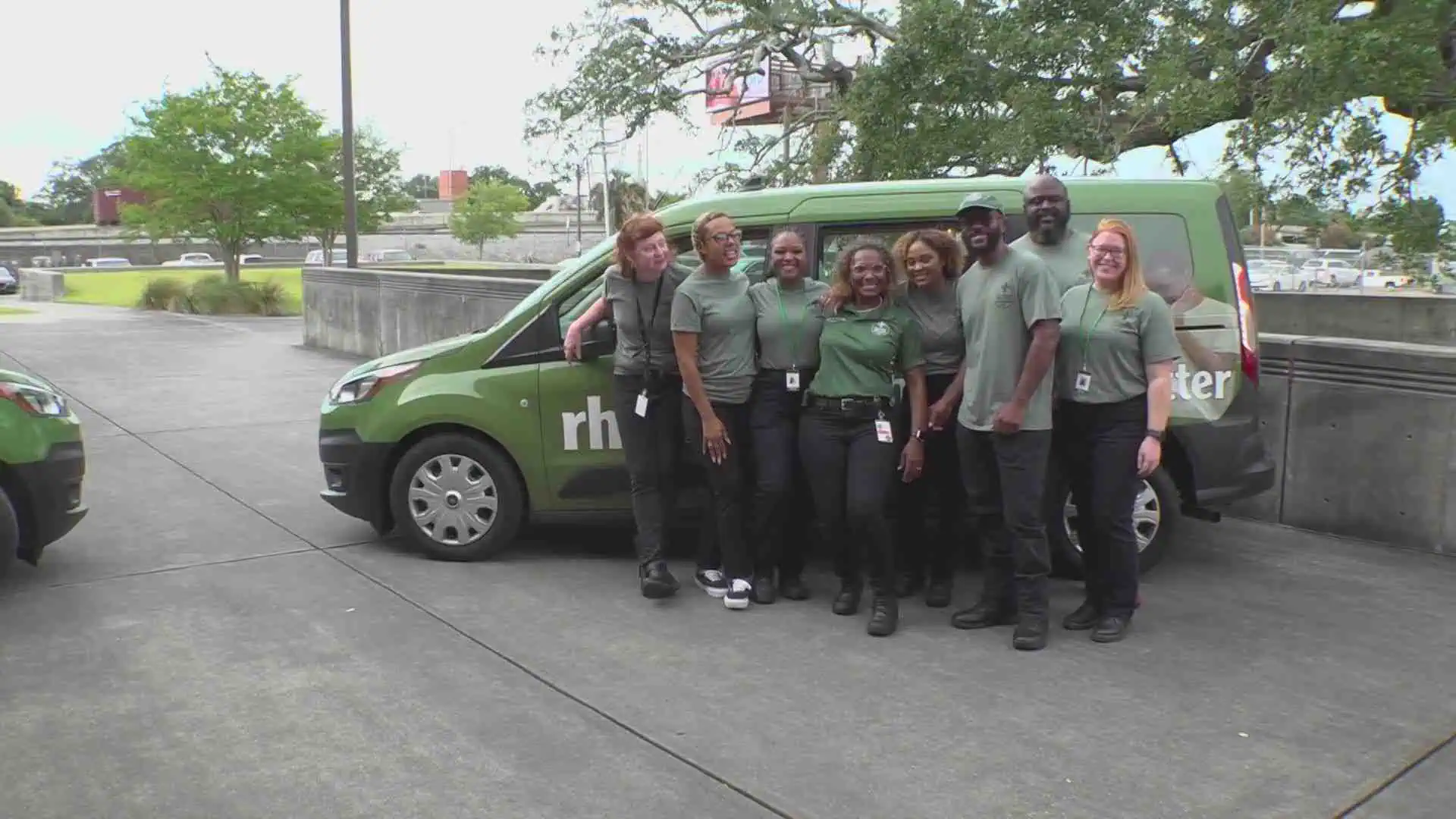
Finding the Right Mental Health Support in Costa Mesa
Mental health Costa Mesa offers a comprehensive network of services, from 24/7 crisis intervention to specialized residential treatment programs. Whether you’re seeking immediate help, outpatient therapy, or intensive care, Costa Mesa provides multiple pathways to recovery through county-run programs, community organizations, and specialized treatment centers.
Quick Access to Mental Health Services in Costa Mesa:
- Crisis Support: 24-Hour Crisis Help Line at (800) 773-8001 for Orange County
- Community Care: Local centers welcome all ages with counseling, testing, and wraparound services.
- Hospital Programs: Area hospitals offer Partial Hospitalization (PHP) and Intensive Outpatient (IOP) programs.
- Residential Treatment: Facilities provide 24/7 structured care with holistic therapies.
- Insurance Options: Most centers accept private insurance, Medi-Cal, and offer flexible payment plans.
Costa Mesa’s mental health landscape includes services for every age group and need. Children and teens can access specialized outpatient programs. Adults 18 and older have access to crisis stabilization units, while older adults 60+ receive targeted support through county behavioral health services. Veterans benefit from specialized PTSD and combat-related trauma programs, and women can find gender-specific care at dedicated facilities.
The city’s approach emphasizes prevention, early intervention, and appropriate treatment at the right place by the right providers. From neuropsychological testing at community centers to evidence-based therapies like CBT and DBT at residential centers, Costa Mesa’s mental health ecosystem addresses anxiety, depression, PTSD, bipolar disorder, schizophrenia, ADHD, and co-occurring substance use disorders.
Finding the right help can feel overwhelming, especially when you or someone you love is struggling. That’s where having a clear roadmap makes all the difference.
At Addiction Helpline America, we’ve guided countless individuals and families through the process of finding appropriate mental health Costa Mesa treatment options that match their unique circumstances and insurance coverage. Our team connects you with vetted providers and helps you understand your options so you can make confident decisions about care.
Know your Mental health Costa Mesa terms:
1. Know Who to Call in a Crisis
When you or someone you love is in crisis, every moment counts. Costa Mesa has a strong safety net of crisis intervention services ready to respond 24/7. These are not business-hours-only resources; they are staffed by trained professionals who understand that mental health emergencies don’t wait.
The mission is to prevent crises when possible, intervene early, and connect people to the right level of care immediately. Whether it’s emergency psychiatric stabilization or a mobile crisis team that comes to you, Costa Mesa’s crisis network is designed to meet you where you are.
Understanding Crisis Services in Costa Mesa
If you or someone you care about is experiencing a mental health emergency in Orange County, your first call should be to the 24-Hour Crisis Help Line at (800) 773-8001. For those in Los Angeles County, the number is (800) 352-3301). Real intake specialists answer these calls and can arrange for a Crisis Team evaluation or immediate referrals for treatment.
Some local hospitals provide many of these critical services through their access departments, which operate around the clock. Their Mobile Crisis Team response is particularly valuable because trained clinicians can come directly to you, whether you’re at home, at work, or somewhere else in the county. This means you don’t have to figure out transportation when you’re already overwhelmed.
For adults 18 and older facing acute distress, some facilities also offer 24/7 Emergency Psychiatric Stabilization. This provides a safe, controlled environment where professionals can assess what’s happening and help stabilize the situation. It’s a critical bridge between crisis and ongoing care.
You don’t have to know exactly what kind of help you need. That’s what these crisis services are for—to assess the situation, provide immediate support, and guide you toward the next right step. These teams respond with compassion, not judgment.
2. Explore County & Community-Based Support Systems
Sometimes the help you need isn’t in an emergency room—it’s right in your own neighborhood. Costa Mesa is home to a network of county and community organizations that exist to support your mental wellness journey, no matter where you’re starting from.
These community-based programs often become the bridge between struggling alone and finding real, lasting support. They’re designed to meet you where you are, whether it’s your first time reaching out or you’ve been searching for the right fit for a while.
Orange County’s behavioral health system has a clear mission: prevent mental health crises, step in early when warning signs appear, and provide effective treatment when it’s needed. The goal isn’t just managing symptoms—it’s helping you achieve genuine wellness and quality of life. These services are often customized to different life stages, with programs for children, adults, and older adults (60+).
Many community organizations are working to make compassionate care accessible to everyone. If you or someone you love needs mental health or substance use support, you can call 949-749-2500 to connect with local resources.
Community service centers often operate with a philosophy of welcoming everyone, regardless of age or insurance status. They may offer individual, family, and couples counseling with licensed professionals in a safe space. Some centers also provide specialized neuropsychological testing to identify underlying conditions that might be affecting mental health, learning, or behavior. For families navigating complex challenges, wraparound services can provide team-based, coordinated care.
Worried about cost? Many community centers accept private insurance, Medi-Cal, and other coverage. If you don’t have insurance, they may offer private pay, super billing, and flexible payment methods. Financial barriers shouldn’t keep you from getting help, and these organizations work hard to make sure they don’t.
3. Evaluate Different Levels of Care for Mental Health in Costa Mesa
When you’re navigating mental health Costa Mesa services, understanding the different levels of care is key. Matching the right level of support to your current needs is one of the most important decisions in your recovery journey.
Think of mental health care as a spectrum. On one end is outpatient therapy, perhaps once a week. On the other is residential treatment, where you live at a facility. In between are several options with varying degrees of structure and intensity. The right level depends on the severity of your symptoms, your daily functioning, and your support system. As you progress, you might “step down” to less intensive options, gradually rebuilding your independence.
Outpatient and Partial Hospitalization Programs (PHP)
Outpatient programs allow you to receive professional care while still living at home and maintaining parts of your daily life. A Partial Hospitalization Program (PHP) is the most intensive outpatient option. You typically attend treatment five days a week for several hours each day, participating in group therapy, individual counseling, and skill-building activities. PHPs are ideal for those who need more support than weekly therapy but don’t require 24-hour supervision.
Intensive Outpatient Programs (IOPs) are a step down in intensity. These programs typically meet three to five days per week for a few hours at a time, often with evening schedules to accommodate work or school. IOPs provide structured therapeutic support with more flexibility than a PHP.
Local hospitals and clinics are trusted providers of both PHPs and IOPs. Many offer programs in both English and Spanish, recognizing that effective therapy happens in the language where you’re most comfortable. With multiple locations across Orange County, you can often access quality care close to home.
The Benefits of Residential Treatment
Sometimes, your daily environment can make healing difficult. Stepping away completely can be a powerful choice. Residential mental health treatment means living at a facility for a period, typically from 30 days to several months, to focus entirely on healing.
The 24/7 support and supervision in residential settings offer safety and immediate help whenever you have a difficult moment. You’re not waiting for your next appointment. Another transformative aspect is the community connection you build with other residents. Surrounded by people with similar struggles, the isolation of mental illness begins to lift.
Removing yourself from daily stressors creates space for deep therapeutic work. You can engage more fully in therapy and develop new coping strategies without immediate pressure. The holistic approach used by many residential centers addresses your whole person, not just your symptoms. You’ll participate in evidence-based therapies like Cognitive Behavior Therapy (CBT) and Dialectical Behavior Therapy (DBT), but you might also find healing through art, music, adventure therapy, yoga, or meditation.
Residential treatment allows for truly individualized care. Staff can fine-tune your treatment plan based on your real-time progress. For some people, this immersive environment isn’t just helpful—it’s life-saving.
Choosing between these levels of care isn’t always straightforward. At Addiction Helpline America, we help you evaluate your situation and connect you with the level of support that makes sense for you.
4. Find Specialized Treatment for Your Unique Needs
Your mental health journey is unique. That’s why mental health Costa Mesa providers have developed specialized programs that go beyond one-size-fits-all approaches. Whether you’re 8 or 80, dealing with anxiety or a co-occurring disorder, there’s a program designed with your specific needs in mind.
Programs for Different Age Groups and Demographics
Age matters in mental health treatment. What works for a teen looks very different from what helps a veteran.
-
Children and Teens (Ages 7-18): Specialized outpatient programs offer industry-leading care that speaks their language, addressing issues like anxiety, depression, self-harm, and disordered eating. Some centers focus purely on mental health in an upscale environment, offering LGBTQ+ affirming care where teens can be themselves without judgment.
-
Adults (18+): Treatment options expand significantly for adults, including 24/7 emergency psychiatric stabilization, various outpatient programs, and targeted support for navigating work stress, relationship challenges, and serious mental illness.
-
Women: Women-only centers provide treatment with all-female staff in a nurturing environment. They address not just addiction, but the underlying trauma, eating disorders, anxiety, and depression that often accompany it.
-
Veterans: Specialized programs focus on combat and non-combat trauma, PTSD, anxiety, and depression. These programs recognize that military service changes how you process stress, and treatment needs to reflect that reality.
-
LGBTQ+ Community: Many Costa Mesa facilities are committed to providing affirming care. They create safe spaces where you can explore your mental health without worrying about judgment or misunderstanding.
-
Young Adults (18-26): Some programs specialize in this transitional stage, empowering young people to build meaningful lives while addressing their mental health needs.
Finding a Center That Treats Your Specific Condition
Costa Mesa’s providers use evidence-based therapies matched to specific conditions, ensuring you get the right tools for your struggle.
-
Anxiety and Depression: Cognitive Behavior Therapy (CBT) is a cornerstone, helping you change thought patterns. Many centers also incorporate mindfulness, art, music, and adventure therapy to help you reconnect with joy and purpose.
-
Dual Diagnosis/Co-occurring Disorders: When a mental health condition occurs alongside substance use, treatment must address both simultaneously. You can’t successfully treat one while ignoring the other.
-
PTSD and Trauma: Specialized trauma therapy helps you process traumatic memories in a safe environment. Dialectical Behavior Therapy (DBT) teaches specific skills for managing the intense emotions that trauma survivors often face.
-
Bipolar Disorder, Schizophrenia, and ADHD: Treatment for these conditions often combines therapy, medication management, and life skills training to help you manage symptoms and organize your life more effectively.
Holistic therapies—art, music, adventure therapy, yoga, and meditation—aren’t just extras. They address the reality that mental health involves your whole being. At Addiction Helpline America, we take the time to understand your unique situation and connect you with programs designed for people exactly like you.
5. Understand Your Insurance and Payment Options
Worrying about how to pay for treatment is a major reason people hesitate to get help. The cost can feel overwhelming, but in Costa Mesa, there are more options than you might think to make treatment affordable.
Understanding your insurance and payment choices is about removing a barrier between you and the support you deserve. Let’s walk through what you need to know.
Insurance Coverage for Mental Health Costa Mesa
Most mental health Costa Mesa treatment centers work to accept a wide variety of insurance plans. Here’s what you’ll typically find:
-
Private Insurance: Many facilities in Costa Mesa work with major carriers like BlueCross BlueShield, United Healthcare, Aetna, Cigna, Kaiser Permanente, and Optum. Always call the facility or use their online tools to verify your specific plan is covered. A quick call can prevent surprise bills.
-
Medi-Cal: Community resources and some treatment centers accept Medi-Cal, ensuring that quality care isn’t limited to those with private insurance. Some services may even be available at no cost to eligible Medi-Cal recipients.
-
Private Pay: If you don’t have insurance, private pay options are available. Many centers offer flexible payment methods, including cash and credit cards. Investing in your mental health now can prevent larger costs down the road.
-
Super Billing: Some providers can give you a detailed invoice to submit to your insurance company for out-of-network reimbursement.
Before committing to any program, verify your benefits. We can’t stress this enough. Check what your insurance covers, including co-pays and deductibles. Our team at Addiction Helpline America is always here to help you explore your coverage options without judgment or pressure.
Using FMLA for Treatment
Taking time off work for mental health treatment shouldn’t mean risking your job. The Family and Medical Leave Act (FMLA) provides eligible employees with up to 12 weeks of unpaid, job-protected leave per year for serious health conditions, including mental health diagnoses. This is a federal right.
To be eligible, you generally need to have worked for your employer for at least 12 months (for at least 1,250 hours) and the company must have at least 50 employees within a 75-mile radius. Your HR department can confirm your eligibility.
Talking to HR is your first step. You don’t need to share every detail; a simple conversation about taking FMLA leave for a medical condition is enough. Your mental health is as valid a reason for medical leave as any physical illness. To learn more about your rights, you can research FMLA eligibility on the Department of Labor website: Learn more about FMLA eligibility.
Frequently Asked Questions about Mental Health Treatment in Costa Mesa
When you’re considering mental health Costa Mesa treatment, it’s natural to have questions. We want to provide clear, straightforward answers to help you make informed decisions.
What is the difference between a Partial Hospitalization Program (PHP) and an Intensive Outpatient Program (IOP)?
A Partial Hospitalization Program (PHP) is more intensive, often requiring attendance five days a week for several hours, similar to a workday. It’s ideal for those needing significant support without 24/7 supervision. An Intensive Outpatient Program (IOP) is less intensive, with fewer hours per week, allowing you to maintain work or school schedules while receiving structured care. People often transition from PHP to IOP as they progress in recovery.
What is a “holistic approach” to mental health?
A holistic approach treats the whole person—mind, body, and spirit—not just the diagnosis. It combines traditional, evidence-based therapies like Cognitive Behavioral Therapy (CBT) with complementary practices that support overall wellness. This can include yoga, art or music therapy, meditation, and nutrition planning. Many Costa Mesa facilities use this approach, understanding that healing happens on multiple levels and creates a stronger foundation for recovery.
What does it mean to have a “co-occurring disorder” or “dual diagnosis”?
A co-occurring disorder or dual diagnosis means you are struggling with both a mental health condition (like depression or anxiety) and a substance use disorder at the same time. These conditions often fuel each other, creating a cycle that is difficult to break. Treating just one condition while ignoring the other is rarely effective. Integrated treatment addresses both conditions simultaneously, helping you understand their connection and develop skills to manage both long-term. Centers in Costa Mesa that specialize in this type of care recognize that your best chance at recovery comes from treating the whole picture.
Conclusion
Taking the first step towards mental wellness is often the hardest, but as we’ve explored, Mental health Costa Mesa offers a robust and diverse network of support. We’ve outlined five proven ways to find the help you need, from immediate crisis intervention to specialized long-term care.
To recap, these pathways include:
- Knowing Who to Call in a Crisis: Accessing 24/7 help lines and emergency stabilization services.
- Exploring County & Community-Based Support Systems: Utilizing the comprehensive services offered by county and community organizations.
- Evaluating Different Levels of Care: Choosing the right fit from outpatient, partial hospitalization, or residential programs.
- Finding Specialized Treatment for Your Unique Needs: Identifying programs customized for age, gender, specific conditions, and co-occurring disorders.
- Understanding Your Insurance and Payment Options: Navigating coverage, private pay, and employee protections like FMLA.
The journey to mental wellness is personal, but you don’t have to walk it alone. Costa Mesa’s dedicated professionals and compassionate communities provide a foundation for hope and healing.
At Addiction Helpline America, we are committed to providing free, confidential, and personalized guidance to help you steer these options. We understand the landscape of care in Costa Mesa and can connect you with the right resources to begin or continue your recovery journey.
Ready to take the next step? We are here to help you Find a personalized treatment program in Costa Mesa today.
Our helpline is 100%
free & confidential
If you or someone you care about is struggling with drug or alcohol addiction, we can help you explore your recovery options. Don’t face this challenge alone—seek support from us.
Programs
Resources
Will my insurance
cover addiction
treatment?
We're ready to help
Find the best
drug or alcohol treatment
center
Are you or a loved one struggling with addiction? Call today to speak to a treatment expert.








